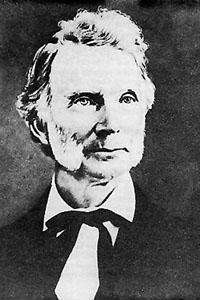Nelson Tift
| Nelson Tift | |
|---|---|
 | |
| Member of the U.S. House of Representatives from Georgia's 2nd district | |
|
In office July 25, 1868 – March 3, 1869 | |
| Preceded by | Civil War |
| Succeeded by | Richard H. Whiteley |
| Member of the Georgia House of Representatives from the state district | |
|
In office 1841, 1847, and 1851-52 – one-year term | |
| Personal details | |
| Born |
July 23, 1810 Groton, Connecticut |
| Died |
November 21, 1891 (aged 81) Albany, Georgia |
| Resting place | Oakview Cemetery, Albany, Georgia |
| Political party | Democratic |
| Occupation | Businessman |
| Military service | |
| Allegiance |
|
| Service/branch |
|
| Years of service | 1861–1865 |
| Rank |
|
| Unit | Georgia Militia |
| Battles/wars | American Civil War |
Nelson Tift (July 23, 1810 – November 21, 1891) was an American jurist, businessman, sailor and politician from the state of Georgia.
Biography
Tift was born in Groton, Connecticut and moved with his family to Key West, Florida in 1826, and then to Charleston, South Carolina in 1830. In October 1835, Tift moved to Augusta, Georgia. He then moved to Hawkinsville, Georgia in March 1836. In October of that year, Tift founded Albany, Georgia and became justice of the peace. On July 5, 1840, he was elected to the Baker County, Georgia Inferior Court and was re-elected to that post in January 1841. In 1840, he owned 11 slaves.[1]
In 1840, Tift was elected as a colonel of the local unit of the Georgia Militia. In 1841, he was elected to the Georgia House of Representatives and was re-elected to that one-year position in 1847, 1851, and 1852. While a State legislature, he supported the reopening of the international slave trade as a means to extend slave ownership to all white Georgians and chastised white artisans for opposing the use of slave craftsmen. Although not an advocate of immediate secession, he accepted the final decision and lent his services to the new nation.[2] Tift founded, edited and published the Albany Patriot newspaper from 1845 until 1858.
In 1850, he owned 8 slaves.[3] In 1860, he owned 9 slaves in Albany, Georgia[4] and an additional 19 slaves spread out over two locations in surrounding Dougherty County.[5]
During the American Civil War, Tift was a Captain[6] in the Confederate States Navy supply department. Tift built gunboats for the Confederate navy and supplied the Rebel army with beef and hardtack produced by his factories at Albany and at nearby Palmyra in Lee County.[7] After the war ended, he was elected to the 40th United States Congress as a U.S. Representative with the Democratic Party and served from July 25, 1868, until March 3, 1869. He was not permitted to qualify for re-election in 1868 and unsuccessfully contested the election of his replacement, Richard H. Whiteley. After his congressional service, Tift worked in various businesses. He served as a delegate to the State constitutional convention in 1877. He died in Albany on November 21, 1891 and was buried in that city's Oakview Cemetery. Tift County, Georgia, was named in his honor but in March 2013 the Georgia Legislature voted to adopt a resolution written by Edd Dorminey of Tifton, Georgia naming Tift County after its founder (and Nelson Tift's nephew), Henry Harding (H.H.) Tift. Because H.H. Tift was living in 1905 when Tift County was founded, the county could not be named after him. Wanting the county to honor the Tifts, the delegates chose Nelson Tift as he was deceased.
Role in Georgia
Tift helped to found Albany, Georgia, in 1836 and for decades was its leading entrepreneur. A booster, he promoted education, business, and railroad construction. During the Civil War he provided naval supplies and helped build two ships. He opposed Radical Reconstruction inside the state and in Congress and was scornful of the Yankee carpetbaggers who came in. Fair concludes that Tift became "more Southern than many natives." His pro-slavery attitudes before the war and his support for segregation afterward made him compatible with Georgia's white elite.[8]
References
- ↑ 1840 United States Census, United States Census, 1840; Albany District, Baker, Georgia;. Retrieved on 21 February 2016.
- ↑ Georgia Encyclopedia
- ↑ 1850 United States Census, Slaves Schedules, United States Census, 1850; District 1, Baker, Georgia;. Retrieved on 21 February 2016.
- ↑ 1860 United States Census, Slave Schedules, United States Census, 1860; Albany, Dougherty, Georgia; page 5,. Retrieved on 21 February 2016.
- ↑ 1860 United States Census, Slave Schedules, United States Census, 1860; Albany, Dougherty, Georgia; page 2, 17,. Retrieved on 21 February 2016.
- ↑ CSA Navy Ranks
- ↑ Georgia Encyclopedia
- ↑ Fair, John D. "Nelson Tift: A Connecticut Yankee in King Cotton's Court," Georgia Historical Quarterly (2004) 88#3 pp 338-374
- United States Congress. "Nelson Tift (id: T000269)". Biographical Directory of the United States Congress. Retrieved on 2009-05-01
External links
- "Nelson Tift". Find a Grave. Retrieved 2010-10-15.
- Nelson Tift entry at The New Georgia Encyclopedia
- Colonel Nelson Tift historical marker
- The Bridge House historical marker
| United States House of Representatives | ||
|---|---|---|
| Preceded by American Civil War |
Member of the U.S. House of Representatives from Georgia's 2nd congressional district July 25, 1868 – March 3, 1869 |
Succeeded by Richard H. Whiteley |
![]() This article incorporates public domain material from the Biographical Directory of the United States Congress website http://bioguide.congress.gov.
This article incorporates public domain material from the Biographical Directory of the United States Congress website http://bioguide.congress.gov.